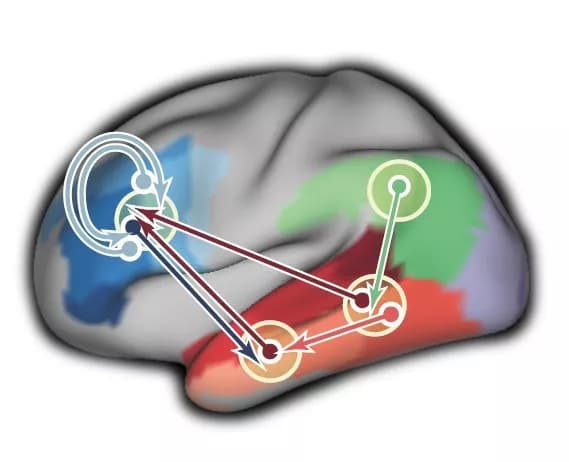
Rhythmic Firing Of Brain Cells Supports Communication In Brain Network For Language
The communication between brain regions specialized in language is supported by rhythmic synchronization of brain cells. Moreover, different rhythms reflect different directions of information flow -- a breakthrough in the research on communication between functionally specialized brain regions. Neuroscientists from the Nijmegen Max Planck Institute for Psycholinguistics (MPI) and Radboud University publish their findings in PNAS on July 11.
Many neuroscientists study demarcated brain regions that are specialized in specific functions, like controlling movement or processing visual information. Jan-Mathijs Schoffelen, a neuroscientist at the MPI and Radboud University's Donders Institute, is interested in the communication between brain regions. This information exchange is necessary for a smooth collaboration of specialized areas. Until now, little is known about these dynamic interactions and how they influence the efficiency of the brain. Simply because the interactions are hard to measure from the outside. Schoffelen: "MRI scanners allow us to see which brain areas are active when we perform certain tasks. We can also see, up to a certain level, how activation patterns between brain areas correlate. But how the interaction between them arises, and how information travels from A to B, is still a mystery."
Brain regions exchange information through so-called action potentials: small discharges of electrical activity in brain cells. Previous research into the visual brain has already shown that rhythmic activity between brain regions generates a protocol that enables more efficient processing of action potentials. "In this study, we demonstrate the same protocol for the network of brain areas involved in processing language. This is a remarkable finding, because language is a much more complex process than vision."
Protocol for the whole brain?
Rhythmic brain activity facilitates information exchange between brain regions, and makes communications more efficient. Furthermore, various rhythms reflect various directions of information flow. "With ours findings, we provide new evidence for the idea that this protocol could be a generic mechanism that also accounts for various other specialized brain regions," according to Schoffelen. Thus, neuroscientists are a small step closer to solving the riddle of how brain regions communicate with each other.
Materials provided by Radboud University. Note: Content may be edited for style and length.
Disclaimer: DoveMed is not responsible for the accuracy of the adapted version of news releases posted to DoveMed by contributing universities and institutions.
Primary Resource:
Schoffelen, J. M., Hulten, A., Lam, N., Marquand, A., Udden, J., & Hagoort, P. (2017). Frequency-specific directed interactions in the human brain network for language. bioRxiv, 108753. DOI: 10.1073/pnas.1703155114
Related Articles
Test Your Knowledge
Asked by users
Related Centers
Related Specialties
Related Physicians
Related Procedures
Related Resources
Join DoveHubs
and connect with fellow professionals

0 Comments
Please log in to post a comment.